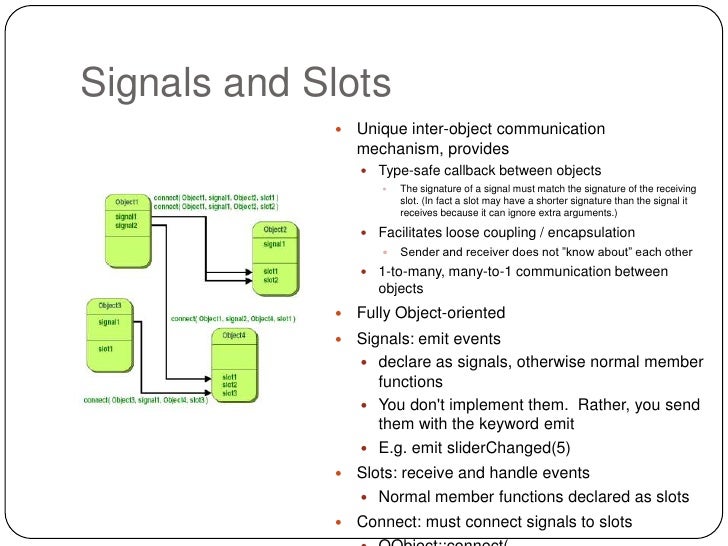- Qt Connect Signal Slot
- Qt Signal Slot Class
- Qt Signal Slot Same Classification
- Qt Signal Slot Performance
Signals and slots are loosely coupled: A class which emits a signal neither knows nor cares which slots receive the signal. Qt's signals and slots mechanism ensures that if you connect a signal to a slot, the slot will be called with the signal's parameters at the right time. Signals and slots can take any number of arguments of any type. Qt 5 continues to support the old string-based syntax for connecting signals and slots defined in a QObject or any class that inherits from QObject (including QWidget) connect (sender, SIGNAL (valueChanged (QString, QString)), receiver, SLOT (updateValue (QString))); New: connecting to QObject member.
Therefore it is not usually necessary to use QtCore.SLOT for Qt slots. However, doing so is more efficient as it avoids a conversion to Python and back to C. Qt allows a signal to be connected to a slot that requires fewer arguments than the signal passes. The extra arguments are quietly discarded. PyQt4 slots can be used in the same way. (Qt) Signals and Slots. Slots Description The moc that connects objects Why Inter-object communication Exmaple Simple example of signals and slots look at.
Quite a frequent problem when working with signals with slots in Qt5, according to my observations on the forum, is the connection of slots in the syntax on the pointers to signals having an overload of the signature. The same applies to slots that have an overload.
Let's take a test class that has overloaded signals.
Here there is a signal, with an overload of the signature. Connect this signal will also be to the slots that are declared in the Widget class, and which also have an overload of the signature.
How it was in Qt4
Within Qt4, everything was solved quite simply by specifying the signature of the signal and the slot in the SIGNAL and SLOT macros.
How it became in Qt5
Qt Connect Signal Slot
But in Qt5, when writing in the new syntax of signals and slots, there are some problems. Because you need to make the static_cast of the method signature.
By the way, the new syntax also allows you to connect signals to slots with a smaller signature, as it was in Qt4.
Advantages of the new syntax
And now a stumbling block. Why use the new syntax of signals and slots? I still hear this question from time to time. Especially when people see such terrible castes of signatures.
Qt Signal Slot Class

Qt Signal Slot Same Classification
- Therefore, I will list potential advantages:The ability to track errors in the connection of signals and slots at the compilation stage, rather than in the runtime
- Reducing compilation time by excluding macros from the code
- The ability to connect lambda functions, it's quite an important bun
- We protect ourselves from errors when we try to connect from the outside to a private slot. Yes!! Yes!! The SIGNAL and SLOT macros ignore the access levels of methods, violating OOP.
Qt Signal Slot Performance
In general, for me this is enough, but for you?
